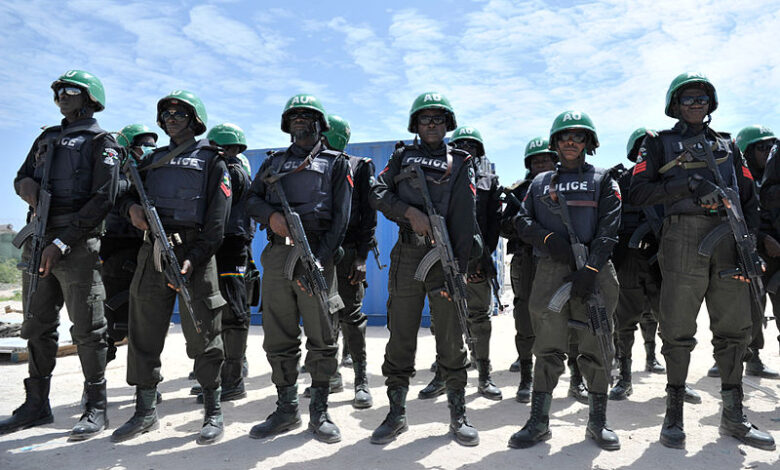Kaduna Report Linking Operatives With Terrorists Reveals Growing Distrust Of Security Sector
Victims of attacks in the state shared experiences that point to the possibility of a cover-up or connivance between terror groups and rogue security operatives in some parts of Kaduna, Northwest Nigeria.

Nasir El-Rufai, Governor of Kaduna State, Northwest Nigeria, said that a preliminary investigation linked some serving police and military officers to terrorists in parts of the state.
The governor, who made this known on Thursday, Feb. 24, during the weekly briefing organised by the Presidential Communication Media Team at the Presidential Villa, Abuja, pointed out that the investigation revealed that the officers have some form of communication with the terror groups.
Although El-Rufai added that the government was yet to have clear evidence to back the report, previous events and experiences by terror victims show a strong possibility of such a link, HumAngle can report.
A source whose relative was kidnapped in late 2021 told HumAngle how terrorists collected ransom openly in a primary school in Tsohon Gaiya. He witnessed someone deliver N10 million cash. There is also a checkpoint nearby, manned by soldiers, yet there was no interference by the security operatives.
When the soldiers asked the source where he was going, and he told them he was on his way to deliver the ransom, they bid him a safe trip. This source made the same journey thrice. The first time to give the terrorists money, the second with a particular brand of motorcycle they demanded, and the third to deliver another brand of motorcycle, a blanket, and shoes.
A commercial motorcycle rider in the area said there was once a new officer who saw what was happening and decided to attack the terrorists. Within a week, he was transferred out of the area.
It can be recalled that a kidnap kingpin, Bala Hamisu, popularly known as Wadume, was arrested in Ibi, Taraba State, on Aug. 6, 2019, by the police for a kidnap case in which he was said to have demanded N106 million ransom.
But between Ibi and Wukari communities, the police team of 10 persons came under fire from soldiers. Three officers and a civilian were killed in the process, while several others were injured.
Wadume was, weeks later, re-arrested by the police.
“The indicted soldiers who were initially charged along with Wadume shockingly had their names removed from the charges by the office of the Minister of Justice and Attorney General of the Federation earlier in June that year.”
Another account by Iliya, one of the almost 70 worshippers kidnapped at Emmanuel Baptist Church in Kakau Daji, Chikun Local Government Area (LGA) of the state, reinforces that the locations of some terrorists are known, as asserted by Governor El-Rufai who advised that they must be wiped out. El-Rufai added that they would never abandon their activities because they make far more money from it than they would have from a legitimate cattle business.
Iliya narrated how he and other captives were moved by their captors to safer areas four times as a result of military airstrikes. In the end, when they were set free on a path leading up to Sabon Gaiya community, also under Chikun LGA and in proximity to the Kaduna-Abuja expressway, they met some soldiers and members of the Civilian Joint Task Force (CJTF) who led them to safety.
Governor El-Rufai suggested that to deal with the criminality permanently, simultaneous ground and air attacks in northwestern states plagued by terrorism must be sustained.
Yet another account by Susan Emmanuel, who was kidnapped alongside her baby brother, reveals that security operatives are sometimes a stone’s throw away from terrorist camps and yet are always reactionary or lack the capacity to attack them.
After being dropped in a village deep within the forest, her abductors told her to follow a certain bush path. Susan met some Fulani men on the way.
“They were going to the mosque. We told them what happened, and they took us to a point where they said we should stop a car and tell them we are going to Abuja junction,” she said.
“When we reached a military checkpoint, the soldiers fed us and took us to a place to bathe. They then took us to their hospital in Kawo.”
Nigeria’s security personnel are known to react, usually after an attack, like the case of Unguwan Gwari where over 20 persons were kidnapped on Dec. 21, 2021.
Residents said the military came after the incident and failed to apprehend the terrorists, who usually lay low until they left.
Another similar incident involves the police attempting to foil an attack in Sabon Tasha area of Chikun LGA, while a mother and her three children were kidnapped at the same time around Oil Village, also in the same area.
Support Our Journalism
There are millions of ordinary people affected by conflict in Africa whose stories are missing in the mainstream media. HumAngle is determined to tell those challenging and under-reported stories, hoping that the people impacted by these conflicts will find the safety and security they deserve.
To ensure that we continue to provide public service coverage, we have a small favour to ask you. We want you to be part of our journalistic endeavour by contributing a token to us.
Your donation will further promote a robust, free, and independent media.
Donate HereStay Closer To The Stories That Matter




